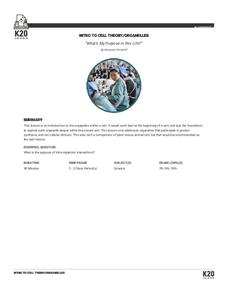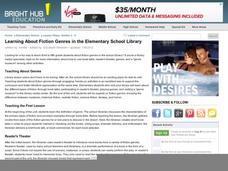Curated OER
Ice Cream: a Taste of Science!!
High schoolers define the term solution. They explain conservation of energy and energy transfer as it relate to how the milk solution became ice cream. Students are able to explain freezing point depression.
K20 LEARN
Rules Of The Mogwai: Lab Safety And Chemical Properties
When you don't follow the rules, bad things can happen! Kick off your next lab safety lesson using a resource from the K20 Center. Pupils partner up to decipher MSDS for common lab chemicals, brainstorm common safety rules and their...
American Museum of Natural History
What's This? Feeding
Some species have pretty creative methods for catching food. Young scientists learn about some interesting ways organisms get the nutrients they need by navigating an online interactive lesson that would be suitable for a remote learning...
K20 LEARN
Water We Going To Do? Floodplains And Watershed Management
How has human activity affected Earth's watersheds? An action-packed lesson plan, part of the K20 Center, examines water's ability to go with the flow regardless of what is in its path. Scholars build model watersheds, examine time-lapse...
K20 LEARN
What's My Purpose In This Life? Intro To Cell Theory/Organelles
Why are we here? Well, if you happen to be a Golgi body, the answer is simple! Young biologists embark upon a journey through the tiny world of cellular organelles with an engaging lesson from the K20 Center. The activities open with an...
K20 LEARN
You're My 'Karyo'-Type: Karyotype For Chromosomal Disorders
What's your type? Genetically speaking, of course! Immerse your class in the world of karyotypes through an insightful activity from the K20 Center. Scholars take on the role of genetic counselors to determine the karyotype of offspring...
Curated OER
Rocks and Minerals
Take young geologists on an exploration of the collection of rocks and minerals that we call Earth with an upper-elementary science instructional activity. Through a series of class discussion and hands-on investigations, students learn...
Towson University
Mystery Disease
How did scientists determine the cause of illness before technology? Science scholars play the role of medical researcher in an engaging guided inquiry activity. Using observations, technical reading, and Punnett squares, learners...
Curated OER
Growing Learners: A Multi-Disciplinary Approach to Investigating Plants and Flowers
Engage young scientists in these inquiry-based lesson ideas to spring into learning about nature.
Towson University
Looking Into Lactase: Guided Inquiry
Milk does a body good ... unless, of course, someone is lactose intolerant. Pupils play the role of pharmaceutical scientists in a guided inquiry lab about lactase. Lab groups collaborate to learn more about lactose intolerance, how...
Towson University
Mystery of the Crooked Cell
Can your class solve the Mystery of the Crooked Cell? Junior geneticists collaborate to learn about sickle cell anemia in a fascinating lesson plan. The included materials help them to examine the genetic factors behind the disease...
Desert Discoveries
Conservation Cartoons
Third graders read and create cartoons about endangered and threatened species of plants. Pupils are split up into groups. They each consider a conservation cartoon and attempt to decipher its meaning. They must decide if they agree or...
Scholastic
Recovery From Drug Addiction
Are there factors that put some individuals at a higher risk for drug addiction than others? Learn more about the risk factors that may make some people more susceptible to addiction, as well as protective factors that help prevent...
Desert Discoveries
Conservation Cartoons
Learners read and create cartoons that are based on endangered and threatened species. The lesson is packed with terrific student handouts, including some very good cartoons that are based on conservation and animal issues. The...
Baylor College
Do Plants Need Light?
Turn your classroom into a greenhouse with a lesson plan on plant growth. First, investigate the different parts of seeds, identifying the seed coat, cotyledon, and embryo. Then plant the seeds and watch them grow! Measure the new plants...
Baylor College
Plant Parts You Eat
Plants provide a variety of delicious foods essential for human survival. In the fourth lesson of this series on food science, young scientists investigate common fruits, vegetables, and grains in order to determine which plant part is...
Baylor College
What's That Food?
Get things cooking with the first lesson in this series on the science of food. Working in small groups, young scientists make and record observations about different mystery foods. These descriptions are then shared with the class and...
Baylor College
Fungus Among Us
In order to learn that mold spores can be found in the air, observers grow bread mold and make observations for a few days. Afterward, they participate in a class discussion to arrive at the knowledge that bread spores are present in the...
Baylor College
Post-Assessment: Global Atmospheric Change
Find out how much your earth scientists learned about the atmosphere in the unit on global atmospheric change with this assessment. After writing a letter to persuade others to make changes to protect our atmosphere, pupils take the same...
Baylor College
Calculating Exponential Growth
There can be a steep learning curve when teaching about exponential growth, but the lesson helps kids make sense out of the concept. When talking about exponential growth of viruses, learners may not be very interested, but when you are...
Voyage Solar System
Round and Round We Go — Exploring Orbits in the Solar System
Math and science come together in this cross-curricular astronomy lesson plan on planetary motion. Starting off with a hands-on activity that engages the class in exploring the geometry of circles and ellipses, this lesson plan then...
Journey Through the Universe
Going through a Phase
Ignore the full moon, it's just a phase. Young scholars observe and record the moon during a full cycle before learning to predict future phases. Then the instructor leads a discussion on the other solar system objects that also go...
Curated OER
Learning About Fiction Genres in the Elementary School Library
Teaching about fiction genres can be challenging. The lesson here, designed for library media specialists, offers a fun way to do it. In the lesson, learners visit the library and learn about the different types of fiction through book...

























